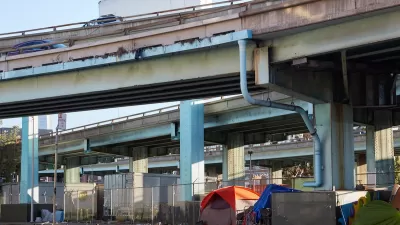The innovative housing program launched during the pandemic has made a significant difference for unhoused individuals, but long-term support remains underfunded.

Carolina Reid summarizes California’s Homekey Program: Unlocking Housing Opportunities for People Experiencing Homelessness, a report from Berkeley's Terner Center for Housing Innovation that assesses the successes and challenges of the innovative housing program. "Developed in the midst of the COVID-19 pandemic, Homekey provides local public entities with large, capital grants that can be used to purchase existing buildings and convert them into housing for people experiencing or at risk of homelessness."
According to the blog, "All told, Homekey 1.0 added 6,000 rooms and/or units to the state’s supply of interim and permanent housing in under six months, at an average initial cost of $238,000 per unit," less than half the average cost of building an affordable housing unit in California.
"We find that Homekey’s grant structure–coupled with giving jurisdictions flexibility in how to use the funds–allowed them to move quickly to respond to local needs." Additionally, "Homekey’s emphasis on speed—facilitated by regulatory streamlining—made all the difference in how quickly localities were able to get people housed."
Reid notes that "For all its strengths, Homekey remains embedded within an underfunded and fragmented affordable housing system. This means that many properties do not have sufficient funding to support long-term operations—this remains the single largest challenge and concern for Homekey grantees." According to the report, "The resources to support resident well-being—including case management, health care, and mental health and/or substance use counseling—also remain well below need."
Reid concludes that the rapid deployment of Homekey shows promise, but the state must continue to support the program with appropriate resources for long-term success.
FULL STORY: California’s Homekey Program: Unlocking Housing Opportunities for People Experiencing Homelessness

Maui's Vacation Rental Debate Turns Ugly
Verbal attacks, misinformation campaigns and fistfights plague a high-stakes debate to convert thousands of vacation rentals into long-term housing.

Planetizen Federal Action Tracker
A weekly monitor of how Trump’s orders and actions are impacting planners and planning in America.

In Urban Planning, AI Prompting Could be the New Design Thinking
Creativity has long been key to great urban design. What if we see AI as our new creative partner?

King County Supportive Housing Program Offers Hope for Unhoused Residents
The county is taking a ‘Housing First’ approach that prioritizes getting people into housing, then offering wraparound supportive services.

Researchers Use AI to Get Clearer Picture of US Housing
Analysts are using artificial intelligence to supercharge their research by allowing them to comb through data faster. Though these AI tools can be error prone, they save time and housing researchers are optimistic about the future.

Making Shared Micromobility More Inclusive
Cities and shared mobility system operators can do more to include people with disabilities in planning and operations, per a new report.
Urban Design for Planners 1: Software Tools
This six-course series explores essential urban design concepts using open source software and equips planners with the tools they need to participate fully in the urban design process.
Planning for Universal Design
Learn the tools for implementing Universal Design in planning regulations.
planning NEXT
Appalachian Highlands Housing Partners
Mpact (founded as Rail~Volution)
City of Camden Redevelopment Agency
City of Astoria
City of Portland
City of Laramie





























